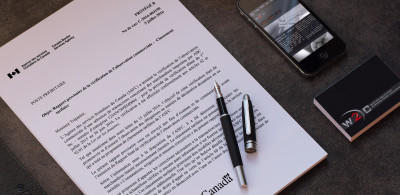It's an all-too-real scenario: you receive a letter from the Canada Border Services Agency (CBSA) telling you that you've been “selected.” What's more, the letter continues, CBSA wants to review some of your imports to see if they comply with existing regulations. As if that weren't enough, the Agency then requests copies of several files or documents and asks you to send them to the auditing officer within the next 30 days…
Your initial reaction (apart from panic) is likely to be: What did I do wrong?
But take a deep breath. There's a reason for everything. And a solution, too.
Why does CBSA conduct audits?
Generally speaking, CBSA can conduct audits for many reasons, including:
- To determine if duties apply according to the HS classification numbers used
- To verify that the correct value was reported on the goods imported/exported
- To confirm that the correct country of origin was declared
Why were you selected?
Even though CBSA does random spot checks, chances are you were targeted for some specific reason. For example, one month it may be looking at importers of bicycles and bike parts, while the next month shampoo exports could be high on its radar. CBSA may also be targeting specific vendors that have a bad track record of supplying inaccurate information or who deal with countries of origin suspected of not complying with trade agreements.
Don't stick your head in the sand
Although your initial reaction may be to just send CBSA the requested copies and wait for further instructions, don't fool yourself: This isn't only about missing paperwork!
Good to know:
The CBSA has already received all the info electronically before ever releasing your shipment. It simply prefers hard copies of everything before proceeding with audits.
Avoid babbling
You may also be tempted to give them a call – the contact details for the CBSA compliance verification officer are usually on the letter. However, the less you say the better!
- While you might want to have a friendly chat to let the officer know you're on top of things, be careful what information you divulge. Why? It could potentially get you into more hot water.
- A common mistake is to say something like, “We've been doing it this way for 20 years and have never had a problem before.” Such an admission could prompt customs officials to dig deeper into the past.
Good to know:
In order to represent you, the broker requires your written authorization, which you will need to send along to the compliance verification officer.
Get ready to do some more digging (maybe)
After receiving your documentation, the CBSA officer may request additional detailed information, such as:
Les fiches techniques
- Technical data sheets for imported goods
- Specific details of how the goods are used
- Confirmation of sale and purchase orders
- Proof of payment or certificates of origin from the country of manufacture
Give your customs broker accurate information
Your customs broker relies on the information provided by you, the importer, and the shipper (the vendor who sold you the goods), to make the customs declaration on your behalf. Moreover, as importer, it's your responsibility to verify the accuracy of the information. This should be standard protocol at your company, so that an audit doesn't catch you off guard.
Good to know:
During an Audit, you may not make further changes to your records!
After the audit is complete: What's next?
A month or two after the audit is complete, you will receive another letter from the CBSA compliance verification officer with details of the findings and instructions on how to proceed, including any necessary corrective measures. However, this is still a preliminary determination. You will now have 30 days in which to provide any additional information that may affect the officer's determination.
- At this point your customs broker will walk you through the determination and help you understand what it means and what the corrective measures entail.
- Any entries that need to be amended will have to be done by your broker, which means additional costs will be incurred for the work. There may also be additional duties and taxes levied.
- Depending on the nature of the infraction, CBSA may also impose penalties that can range from $150 to $5,000 per infraction with a maximum of $25,000 per occurrence. As you can see, errors can be very costly!
What happens when the determination is deemed final?
Unless the CBSA officer receives information that affects the status of the customs audit, the final determination will usually be the same as the preliminary one.
- You will then have 90 days to comply with this decision and file any necessary amendments, which can be problematic if there are many entries that need to be addressed in this time frame.
- There are rare cases when nothing is found to be amiss or the corrections are minor and no additional duties or taxes need to be paid. There are some even rarer cases when no action is required at all!
Always keep the paperwork
Always keep copies of all decisions in your files and don't rely on CBSA to refer back to a previous audit decision. As the importer, keeping the documentation is on your shoulders.
- It's not uncommon for a compliance verification officer to penalize an importer for non-compliance even though the importer was simply following instructions from a previous CBSA audit done, for example, two years earlier. The officer simply may not have been aware of this prior audit – all the more reason for keeping the proof you (as the importer) may need to avoid being penalized unnecessarily.
A recommended safeguard
Carrying out an annual or preferably bi-annual compliance audit is a must in order to mitigate your financial risk in the event of a CBSA audit. Your customs broker can help you make this a permanent part of your company's activities.

